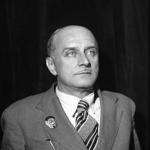
Today the name of the choreographer Fyodor Vasilievich Lopukhov as a stage director of individual dances is modestly mentioned in programmes of just a very few Mariinsky Theatre productions. But it is, in fact, to him that to a great extent we owe the wealth of the ballet repertoire that combines classical masterpieces and bold endeavours in seeking out new dance ideas.
Joining the Mariinsky Theatre after graduating from the St Petersburg Theatre School in 1905, Lopukhov was able to see "the greats" of the era of Marius Petipa on stage. Having been raised on true examples of classical dance and gone through the instructive process of appearing in productions from the golden age of St Petersburg classicism, Lopukhov forever maintained an admiration for the enchanting harmony of the productions of his senior colleague. And when, amidst the confusion of the hard times following the Revolution, the new masters of culture considered among other things that Petipa's Sleeping Beauty was out of date and unnecessary Lopukhov defended this masterpiece and preserved it. In restoring the cuts to Tchaikovsky's score, Lopukhov revived lost elements of the ballet. Legendary evidence of his deep understanding of Petipa's style and signature came with the story of Lopukhov's creation of the variation of the Lilac Fairy in the prologue of The Sleeping Beauty. As far back as 1914 the young choreographer created it as a concert piece. And the respected soloist of the imperial theatre, Petipa's favourite Pavel Gerdt who wanted his daughter to dazzle with technique in the rather non-dance role of the Lilac Fairy, succeeded in including this variation in the production. Gerdt's assertion that this variation had been created by Petipa but was not performed merely because the first Lilac Fairy – the choreographer's daughter Maria Petipa – could not learn it, was accepted as the truth by the Board of the Imperial Theatres. To this day, one of Lopukhov's earliest creations embellishes The Sleeping Beauty. Moreover, Fyodor Vasilievich, years later, when the variation had become a fixture in the ballet and its authorship was no longer hidden, declined in principle to have his name on the playbill, considering himself to be not a co-creator but merely a pupil of a great master, following in the footsteps of his teacher Petipa.
In this noble service to the classical tradition and the dance of the Lilac Fairy embodying harmony, one can arguably hardly recognise the bold experimentalist. But in the 1920s in his own productions Lopukhov amazed audiences with his high, almost acrobatic supports, splits and other elements previously not associated with ballet. His Firebird, radically novel Nutcracker and The Ice Maiden were to become legends in reviving the language of dance. And his revolutionary attempt to reject plot in favour of pure dance, subject to the development of musical form, gave ballet a new direction in the dance symphony The Magnificence of the Universe. And today the whole world dances the choreography of Balanchine, who as a youth appeared in Lopukhov's dance symphony and went on to develop its essential concept.
Of the more than twenty original ballets by Lopukhov none survive today. Productions by his students survive – convinced of the need for special training for choreographers, Lopukhov organised choreography courses at the Leningrad School of Dance and the faculty of choreography at the Leningrad Conservatoire and, once engaged as Director of the Kirov Ballet and the Maly Theatre, he stood up for the search for new ideas. Lopukhov's books survive, illustrating the amazing and rare nature of their author – the ability to create a theoretical generalisation of a very specific profession. And if most of Lopukhov's choreographic creations remain but mere legends, his literary works have forever recorded the sheer scale of the personality of this dance innovator and zealous guard of traditions, this coach and theoretician – Fyodor Vasilievich Lopukhov.
Mariinsky Ballet soloists will be dedicating the performance of The Sleeping Beauty on 13 December to choreographer Fyodor Lopukhov.